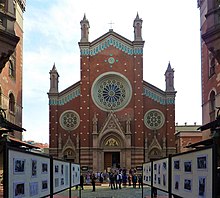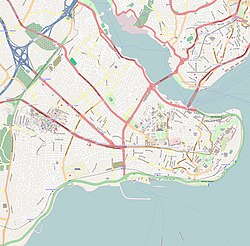Church of St. Anthony of Padua, Istanbul
| Church of St. Anthony of Padua | |
|---|---|
| Sent Antuan Bazilikası | |
 S. Antonio di Padova on İstiklal Avenue | |
| Location | Beyoğlu, Istanbul |
| Country | |
| Denomination | Roman Catholic |
| Architecture | |
| Architect(s) | Giulio Mongeri |
| Style | Gothic |
| Groundbreaking | 1906 |
| Completed | 1912 |
St. Anthony of Padua Church, alternatively known as the Sent Antuan Bazilikası or Sant'Antonio di Padova Church, S. Antonio di Padova, St. Antoine, or locally as Sent Antuan, is a basilica and the largest church of the Roman Catholic Church in Istanbul, Turkey. It is located at İstiklal Avenue No. 171 in the Beyoğlu district.
Along with the Cathedral of the Holy Spirit (1846) in the Harbiye district, St. Louis of the French (1581) and Santa Maria Draperis in Beyoğlu, Sts. Peter and Paul (1841) in Galata, Assumption Church in the Moda quarter of Kadıköy, St. Stephen in Yeşilköy and Bakırköy Church in Bakırköy, St. Anthony of Padua is one of the most important Catholic churches in Istanbul, and among them has the largest community following its Masses.
The original St. Anthony of Padua Church was built in 1725 by the local Italian community of Istanbul, but was later demolished and replaced with the current building which was constructed on the same location. The current St. Anthony of Padua, along with its adjacent buildings (known as the St. Antoine Apartmanları) on İstiklal Avenue, was built between 1906 and 1912 in the Venetian Neo-Gothic style, and was likewise edificed by the local Italian community of the city, mostly of Genoese and Venetian descent, who amounted to 40,000 people at the turn of the 20th century. The building was designed by the Istanbulite Levantine architect Giulio Mongeri, who also designed many other important buildings in Istanbul and Ankara; such as the Maçka Palas (which houses Armani Café and Gucci) in Nişantaşı and the Neo-Byzantine style Karaköy Palas bank building in Karaköy (Galata), Istanbul; as well as the first headquarters of Türkiye İş Bankası in Ankara.
The church is considered a minor basilica,[1] and is run by Italian priests. Saturday Mass is in Italian and begins at 19:00, Sunday Mass is 9:30 in Polish, 10:00 in English and 17:00 in Turkish, and Tuesday Mass is in Turkish and begins at 11:00. Weekday Masses are in English at 8:00.
Together with the churches of St. Mary Draperis, also on Istiklal Caddesi, and of SS. Peter and Paul in Galata, it was one of the three Levantine parishes in Beyoglu.
Pope John XXIII preached in this church for 10 years, when he was the Vatican's ambassador to Turkey before being elected as pope. He is known in Turkey with the nickname "The Turkish Pope" because of his fluent Turkish and his often expressed love for Turkey and the city of Istanbul.
A legal battle over the church has been going on since 2016.[2] The Church of St Anthony of Padua has been put up for sale by a man claiming to act for the legal owner of the site.[3] According to news reports, Sebahattin Gök obtained power of attorney from the owners of the land, and then attempted to sell the site, before lawyers acting on behalf of the Vatican put measures in place to prevent the sale.[2]
Gallery
-
Church of St. Anthony of Padua
-
Church of St. Anthony of Padua front of complex
-
Church of St. Anthony of Padua back of front of complex
-
Church of St. Anthony of Padua interior
-
Church of St. Anthony of Padua interior
-
Church of St. Anthony of Padua interior
-
Church of St. Anthony of Padua entrance from inside
Notes
- ^ Basilique Saint Antoine de Padoue, Istanbul, Turkey, GCatholic.org. Retrieved 2011-03-16
- ^ a b "Ülke ülke gezip mirasçılarını buldu Sent Antuan Kilisesi'ni satışa çıkardı". www.sozcu.com.tr (in Turkish). Retrieved 27 February 2020.
- ^ "İstiklal Caddesi'ndeki Sent Antuan kilisesi 'satışa çıkarıldı', başrahip tedbir kararı koydurdu". Diken. 27 February 2020. Retrieved 27 February 2020.
References
- "Sent Antuan Kilisesi" [Church of St. Antony] (in Turkish). Retrieved 5 June 2010.
External links
- Some more pictures
- "Church of St. Antony". on katolik kilisesi.
- Use dmy dates from May 2013
- Roman Catholic churches completed in 1912
- Roman Catholic churches in Istanbul
- Roman Catholic churches in Turkey
- Gothic Revival architecture in Turkey
- Venetian Gothic architecture
- Beyoğlu
- Gothic Revival church buildings
- 1912 establishments in the Ottoman Empire
- 20th-century Roman Catholic church buildings








